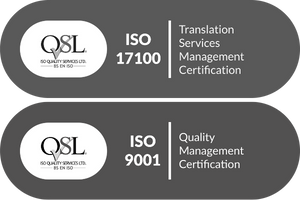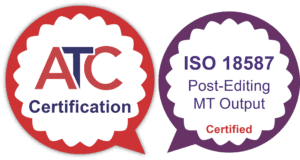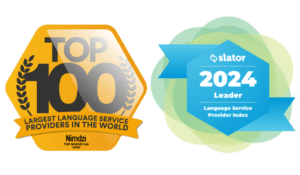At Linguava, we’re committed to bridging language barriers in healthcare, enabling better communication and understanding between providers and patients. Bridging the language barrier, especially in healthcare, requires that we start by building relationships. Daniel Halberg, our Senior Training Manager, along with our account management team, have built relationships through provider training and quality services focused on patient outcomes. As part of our series, “Connecting Care: Stories of Language Access in Healthcare,” Daniel had the privilege of interviewing Dr. Moshtael from the Kartini Clinic, a pioneer in pediatric eating disorder treatment since 1998. Watch the interview or read on to learn insights from their conversation, which highlights the clinic’s unique approach to care and the importance of cultural sensitivity in treatment.
A Sanctuary for Healing: Kartini Clinic’s Mission
The Kartini Clinic was established in 1998 with a clear mission: to provide a supportive environment for children with eating disorders, distinct from traditional psychiatric inpatient facilities. Dr. Moshtael, originally from Iran and raised in Africa, brings a rich cultural perspective to their work. The clinic’s holistic approach ensures that children’s families are engaged and included in their children’s comprehensive care. This whole-family model of care involves parents and collaborates closely with schools, ensuring that the treatment extends beyond the clinic walls.
Embracing Cultural Diversity in Treatment
One of the clinic’s standout features is its dedication to working with multilingual and multicultural families. Dr. Moshtael emphasizes the importance of presenting information in a non-Eurocentric manner and adapting meal plans to reflect different cultural backgrounds.
“Food is medicine for our kids, so without food, I cannot heal the kids,” she explains, “the majority of us who come from a different side of the world, we think about food with love. Then someone tells me that I need to measure the food that I need to give my child? Or that it needs to come in the form of a sandwich?”
Kartini’s ability to collaborate with families from diverse backgrounds to create culturally relevant meal plans that resonate with their patients is an essential part of their care strategy.

However, Dr. Moshtael also notes the limitations of translation alone. For instance, materials for families from Central and South America require more than just a Spanish translation. Some families may have distinct levels of literacy, adding another layer of complexity. To address this, the clinic accommodates pictorial food plans, reducing shame and guilt associated with literacy challenges.
The Role of Interpretation in Healthcare
Working with patients who speak different languages involves several key considerations:
- Effective Use of Interpretation: Understanding how to integrate interpreters into the care process is essential. At Kartini Clinic, interpreters are used for weekly updates, family therapy appointments, and more. Providing interpreters with a short briefing and a list of questions ahead of time can enhance the quality of communication.
- Navigating Insurance: Serving a diverse patient population, especially including those with Medicaid and Medicare coverage, requires providers to deploy language services. Ensuring equitable care means training staff on scheduling and working with interpreters, and translating vital documents.
- Pre-translating Materials: Preparing translated materials in advance can facilitate smoother interactions and better understanding during appointments.
Cultural Sensitivity in Mental Health
Dr. Moshtael highlights the importance of cultural sensitivity in mental health care. Are providers willing to include peer support from individuals of the same culture or beliefs? While parent group meetings can sometimes be hampered by language barriers, the willingness to adapt and provide culturally relevant support is vital.
Continuous Learning and Improvement
Training staff to work effectively with interpreters is crucial for successful patient care. Dr. Moshtael finds regular training sessions beneficial, allowing staff to ask questions and learn best practices. Such training should ideally occur every 2-3 years to stay current with evolving needs and techniques as well as staff turnover. Training staff is a key element of complying with state and federal regulations regarding equitable care for linguistically diverse populations.
Final Thoughts: The Heart of Pediatric Care
For those new to working with interpreters, or looking to improve their multicultural pediatric care, Dr. Moshtael offers valuable advice:
- Embrace the love and diversity that come with serving a diverse population.
- Be prepared for challenges and ensure proper time allotment for appointments – working with interpreters may take longer than an English only session.
- Have a plan and provide staff with ongoing training on working with interpreters.
- Reflect on what went wrong if things don’t go as planned, and strive for improvement.
The staff at Kartini Clinic embody the motto, “Remember, your patients are your teachers,” striving to provide equitable care every day. By working together and respecting cultural differences, healthcare providers can create a supportive and effective environment for every child and family they serve.
About Linguava Interpreters
At Linguava, we are here to support you as your partner in language access. We are ISO 9001, 17100, and 18587 certified, ensuring quality . As a leading provider of language services for the healthcare industry, we offer a wide range of services to help medical practices incorporate language access successfully. These include Translation and Localization , Scheduled Video Interpretation, Video Remote Interpretation, Over the Phone Interpretation, and American Sign Language Interpretation.
If you have a file ready to translate, get your file analysis and free quote here.









